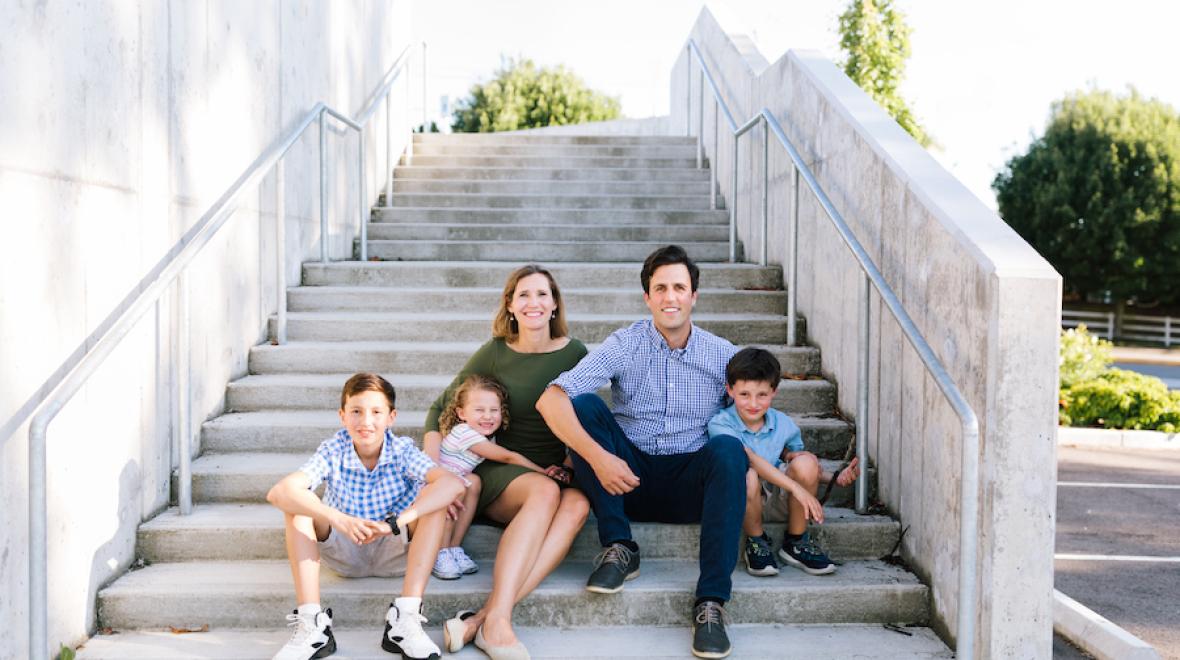
Photo:
OSPI Superintendent of Public Instruction candidate Reid Saaris with his family. Photo courtesy of the candidate.
|
Welcome to our series on the 2024 race for Superintendent of Public Instruction. Meet the other candidates and learn more about what this role does and why it matters to Washington families: What Parents Need to Know About the 2024 Fight to Be Washington’s Next Education Leader |
Primary prep
To help parents prepare to vote in the primary election on Aug. 6, ParentMap reached out to the 2024 candidates for our State’s top education leader role to learn more about their visions for the future of Washington schools and what kind of students they were as kids.
Methodology
We sent the same questions to all four of the 2024 candidates via email. These are their unedited, full responses. We also requested two photos, a headshot and a more casual portrait that could include family. The only changes we made were to address any typos. ParentMap wrote the bios that are included for each candidate.
Reid Saaris bio
Reid Saaris is the founder Equal Opportunity Schools, a Seattle-based national nonprofit organization that works to increase access to advanced courses for underrepresented students. His primary background is in education policy and advocacy, and he also taught for one semester at Rainier Beach High School in Seattle during the fall of 2023. He holds a Master of Business Administration from Stanford, and a Bachelor of Arts from Harvard. His campaign is focused on educational equity, enhancing student support services and improving school funding in Washington state.

ParentMap: How do you plan to address the mental health needs of students, especially in light of rising rates of youth anxiety and depression?
Saaris: Ultimately, mental health support comes from when students have everything they need to thrive. That means housing, food, basic necessities, and educational or professional opportunities. Providing the resources kids need to lead a successful life is a strategy to address mental health concerns. OSPI can work toward this by ensuring all kids have access to nutritious food in schools, high-quality afterschool programs, and uplifting the diversity of the opportunities available to kids after high school — whether that’s a career in the trades, college or more that lead to a thriving and healthy life.
Specifically, I have always been an advocate for stronger mental health and crisis response resources in schools.
Most recently, I completed a report with the Children’s Alliance that found 1 in 10 adolescents reported attempting suicide in the prior year. We know for young men in particular, that the means of choice is predominantly firearms which are significantly more lethal. We need to live up to the demands kids are making when they walk out of school and protest for more therapists, counselors and support staff. They are crying out for help and as leaders, it is our job to do everything in our power to deliver a better future for them.
PM: What strategies do you propose to address and prevent gun violence in schools and ensure the safety and security of all students and staff?
Saaris: School safety issues are exactly why it’s so important that we ensure all schools have strong behavioral health supports and more staff to meet student needs. Teachers simply cannot be expected to play this role without much better support. Nearly 50 percent of teachers reported that they saw an uptick in student violence last year and almost 70 percent reported feeling anxiety as a result.
OSPI must ensure each school district has a plan for teacher and student safety including proper guidance and skills training.
Outside of traditional safety measures, we need to invest in and support community violence intervention programs that work with students, de-escalate conflict and support students. There are strong examples of these programs in south King County that should be replicated and supported statewide.
We need to treat students immediately when there are escalating concerns; but we also need to address underlying causes to ensure our students and teachers are much safer in the long term.
PM: What is your stance on cell phone use in schools and how do you plan to balance the benefits of technology with the need to minimize distractions?
Saaris: The influence of cell phones and social media on our kids is something I’m deeply concerned about and that we need to address by adopting the US Surgeon General’s guidance of lowering the age social media is allowed to 13, and working with the next Attorney General to enforce these rules. We also need to make sure we are better preparing students for the impact these new technologies have on their lives and learning.
As for cell phones specifically, I believe the office of OSPI should be helping roll out guidance to districts that want to implement these bans, but I do not believe that a statewide ban on cell phones would be an appropriate action.
Each district should be allowed to continue its individual control of these policies. When I was teaching most recently this last year, I gave students the option to lock up their phones at the door. Those who took advantage of this option were more likely to engage in class discussions and overall performed better. And while this is anecdotal evidence, I want to make sure other teachers and district administrators are aware of the tools that are available to implement these changes.
PM: What measures will you take to address the achievement gap and ensure equitable education outcomes for all students?
Saaris: It’s shocking that Washington does not have a more robust and equitable funding formula that reflects our values and invests the needed economic resources in the most high-impact way that we can: in public education. We currently fund our lowest-performing schools at 16 percent below the average, when we need to be investing more. However, I have talked with many legislators who are wary of substantially increasing funding for public education with the current OSPI leadership, because of the office’s failure to answer basic audit questions about the use of funds, and failure to clear the US Department of Education’s compliance bar for use of ESSER dollars. We need new leadership to achieve some early wins for educator compensation and behavioral health that can rebuild confidence in our ability to deploy major new funding more effectively and ensure that resources reach teachers and students and are effectively accounted for. I have partnered with states that have overhauled funding formulas in favor of more equitable approaches. This will take major increases in funding to do well in Washington, and I’m eager to collaborate with the Legislature and others to build our achievable plan to fully and equitably fund a future for Washington public education that will show the world all that’s possible when we invest in our educators and best-in-class systems to support them and their students.
PM: What is your perspective on Senate Bill 5462, which the Washington Legislature recently approved. This bill requires that schools update curriculum to include LGBTQ+ histories, perspectives and contributions.
Saaris: LGBTQ+ history is our history. We need to be teaching the truth of what has happened and how those actions came to be as part of our curriculum. SB 5462 does this by helping students connect historical pathways to better understand the world around them today. By teaching age-appropriate material to students, they can build on their critical thinking skills to draw parallels between events of the past and now.
When LGBTQ+ history and perspectives are incorporated into our classrooms, students who identify as part of this community are represented in class and have better outcomes.
In addition, it also lowers the levels of hostility they feel and they are less likely to experience bullying. OSPI needs to be a welcome voice in helping districts implement these standards, as well as provide follow-up guidance to districts who may be failing to meet the standards. OSPI should also be prepared to work with districts on how to work with parents looking to learn more about what their students are learning in the classroom.
PM: How would you describe the kind of student you were when you were in school?
Saaris: I was a purple hair, black baggy jeans, Seattle 90s grunge-scene kid. However, I had the privilege of having a mother in the education system.
She made sure I was enrolled in the right classes, at the right time, and my grades and my post-secondary education reflected the privilege that was granted to me.
Meanwhile, my best friend across the hall came from a home with limited access to this information and had a very different outcome. This is why I built my life in education, so all students, regardless of their parent’s capacity, can achieve their highest potential.
PM: What was the last book you read? What’s one thing that surprised you about this book?
Saaris: My most important job will always be as a father to three, and as a first-time candidate, I have very limited time to read my usual. So, while my youngest is quickly getting to the point of no longer needing me to read bedtime stories, after a long day of speaking with voters, it is still one of my favorite ways to end the day.
“Every Night is Pizza Night” by J. Kenji López-Alt (a recent transplant to Seattle) is my most recent read. While I don’t want to give away any spoilers, the message resonates with me and the theme of my campaign.
López-Alt uses the story of Pipo to show how different families from every culture expand her view on what makes the best dinner. By being open to exploring new options Pipo can engage her love of the culinary world. The parallels between how one views our education system and those faced by Pipo’s journey, a thesis that brings me back to my days in school, offer a simplified version of my vision for OSPI. Every student’s and educator’s voice and experience should be brought into consideration when developing policies, an action I intend to hold myself to.
PM: Describe your ideal Pacific Northwest day.
Saaris: Joining my running group early Saturday morning for a run on Tiger Mountain and coffee from Boona Boon Coffee in Renton. Going to the farmers market with the family to get fresh cherries to eat in the park while I catch up on reading and watching our kids play. Trying out to newest restaurant in town for a late lunch. Afternoon nap in the sun before yard work. Putting my kids to bed after family movie night and homemade pizza. Sitting on the porch watching the sunset over the mountain with my wife.
Find the other candidates’ responses and ParentMap’s OSPI Superintendent feature: |
Editor’s note: ParentMap reached out to candidate John Blair multiple times via email and phone between July 3 and the publishing of this story and did not receive a response.











